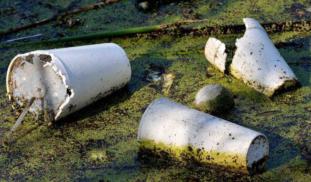Please wait...
About This Project
The primary objective of the project is to create an industrially-comparable method of producing PHA, a biodegradable plastic, from Styrofoam (polystyrene) waste. We hypothesize that a genetically modifying E. coli can convert styrene (monomerized polystyrene) to P3HB, a specific PHA, with just two plasmids. Our device will aim to reduce the 30% of plastic waste volume accounted for by polystyrene while simultaneously enabling cost-effective production of PHA.

Browse Other Projects on Experiment
Related Projects
Highly-sensitive, real-time enzyme methane oxidation rate measurements using an electrochemical assay
A low-cost, rapid, and highly sensitive assay is needed to measure methane gas oxidation rates by methane...
Engineering of a suction cup stethoscope for non-invasive monitoring of physiological sounds in baleen whales
Baleen whales are large-bodied predators that, despite their critical role in marine ecosystems, our understanding...
Building a better fish: Engineering fish for smarter aquaculture
What if we built a better fish instead of depleting wild fisheries? Natural stocks can’t keep up with demand...




